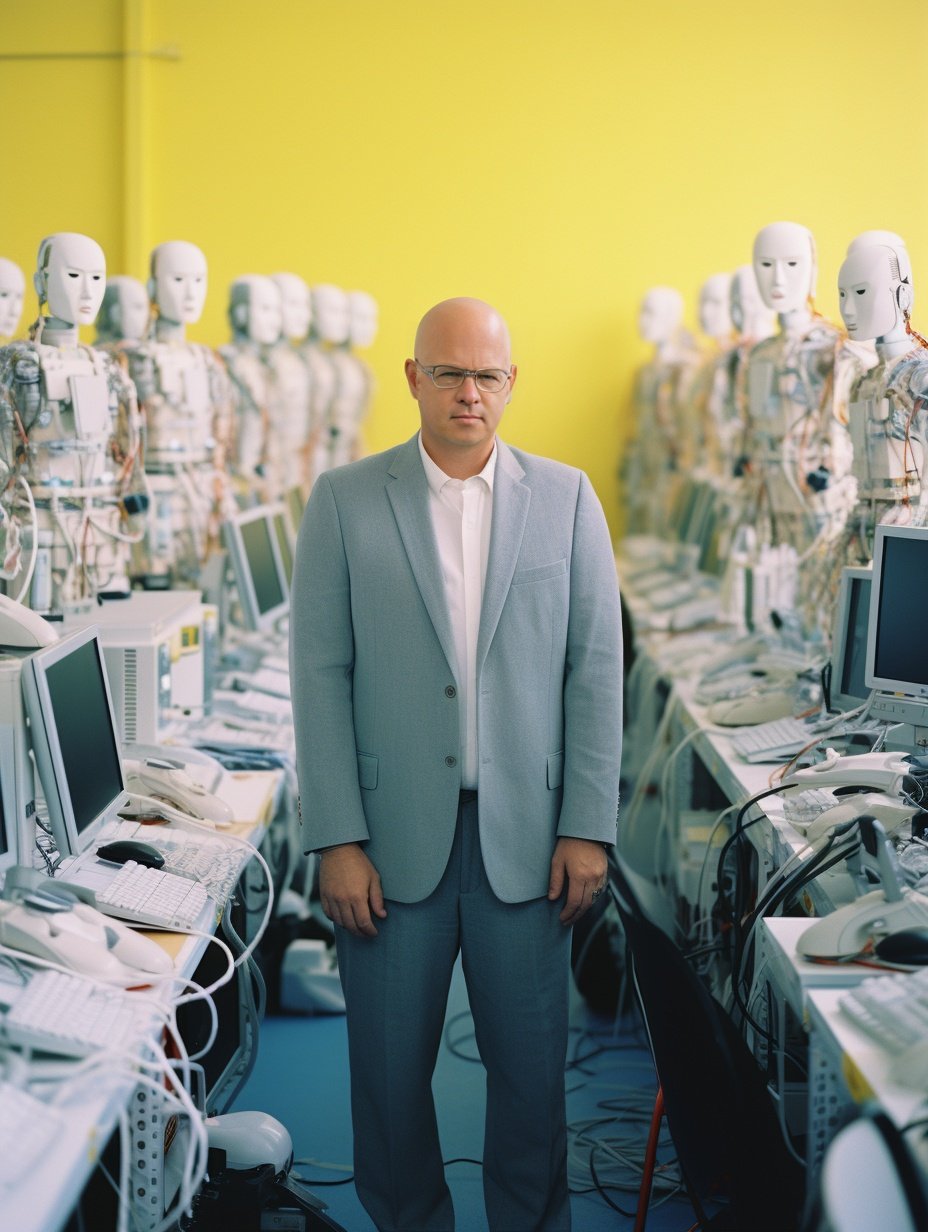Stephen Waddington on AI by AI
This article was generated by ChatGPT4, from the transcript of an interview with Stephen Waddington on the use of AI in public relations. The transcript was the same one used to write the human version of this article, which had been cleaned and proofed, but contained no additional context, just Stephen’s words. ChatGPT’s limits on character count meant the transcript was split into three, with the same prompt used each time with just the requested style changed in each case.
Prompt
Please write the first part of an article based on the below interview transcript. The interview is with Stephen Waddington, founder of Wadds Inc, on the topic of the use of AI in public relations. Be concise and direct with your language, and write in the style of [Christopher Hitchens/Marina Hyde/George Orwell]. Use approximately 40% direct quotations from the transcript, alongside re-written elements from the transcript, and broader context on the PR industry and on Stephen sourced from the internet.
Words by ChatGPT4
Photography by Midjourney
Part One: in the style of Christopher Hitchens
The artificial intelligence revolution, long prophesied, is no longer a matter of science fiction. It's not even particularly novel, according to Stephen Waddington, the erudite founder of Wadds Inc. "This stuff has been with us since the 1950s," he dryly observes, unimpressed by what some might regard as a seismic technological shift.
Now, with the recent "democraticisation" through Midjourney, ChatGPT, and Dall-E, this old hat trick has been handed to anyone with an internet connection. Waddington's tone is sardonic as he describes this newfound accessibility: "suddenly anyone with a web browser and access to the internet could do this stuff, so you can touch it, feel it and see it."
However, with great power comes great responsibility—or, as it seems, great irresponsibility. Who owns what in this brave new world of virtual creation? Waddington asks, not without a hint of scorn, “What copyright works do you have over that? We don’t know. There’s no regulation for that.”
And what of disclosure? Must the world be informed that your latest prose or imagery was the work of a machine rather than human genius? Waddington compares it to revealing the use of Word's spell check or Photoshop's enhancements, his voice dripping with irony. "In the media at the moment, you’ll see ‘this is generated by AI’, probably as much as an arse-covering exercise as a public disclosure," he observes, his disdain for the lack of clear guidelines evident.
Regulation, that great bugbear of innovation, rears its head, yet Waddington contends with some degree of pessimism that we cannot simply put it on the shelf and wait for the sci-fi reality to arrive. It's a bureaucratic quagmire, but one that's being tackled by a parliamentary panel.
As we stand on the precipice of this technological frontier, Waddington sees an opportunity akin to the birth of the internet or social media. He advises with a knowing edge, "You have a moment right now [...] where if you are ahead of this it will act as a natural accelerant in your career."
The corporate machinery is already whirring into action, and Waddington provides a knowing look into the c-suite's concern over AI. He also sounds a warning, tinged with intellectual arrogance, about the impact of AI across all sectors.
Lastly, he regales us with an anecdote about bots joining meetings without their human counterparts, and the potential of AI to reduce complex documents into digestible summaries. “That’s really a power application,” he asserts, clearly impressed by this practical superpower.
In Waddington's world, we find a landscape fraught with peril and potential, complexity and confusion. The bold will thrive; the hesitant will falter. And above all, we must grapple with the ethical maelstrom that AI has unleashed upon our world. His message is as clear as it is unapologetic: the future is here, and we must confront it, whether we like it or not. The pen may be mightier than the sword, but is it mightier than the algorithm? Only time, and perhaps a bit of human ingenuity, will tell.
Part Two: in the style of Marina Hyde
"I started off working after university as a technical editor," he says, which, to many, would seem as dry as an overcooked Sunday roast. But Waddington’s journey through the treacherous world of PR wasn't without its seasonings of excitement. This was the middle of the 90s, where an electrifying energy was swirling in the UK around the likes of Acorn and ARM. And that's exactly where our protagonist began his career, "doing technical comms and product comms for ARM."
The thematic, as Waddington describes his trajectory, seems to meander from one innovation to the next, like a charmingly erratic tale of Alice through the Technology Wonderland. From working as a technical editor, Waddington traversed the world of electronic communications and eventually found his way "formally into public relations agencies."
But dear reader, don't be misled into thinking that this was a calculated career choice. "I did an electronics degree, so comms, public relations, wasn't a natural domain for me," he confesses. Much like an adventurer led by curiosity, Stephen fell into PR almost by accident, guided by his passion for technology and communication.
The Dot Com boom, with "all of the madness around when retail got impacted by the internet," was like a feverish party to which Waddington and his agency were eagerly invited. "I spotted the opportunity to build out a PR agency working, helping the companies building out the internet with their profile and reputation."
While some might find this "quite dull," it’s as though Waddington was painting a masterpiece using the tools of PR. The emergence of social media provided yet another canvas, allowing him to build a second agency. It’s a painting, as colorful as a London bus on a rainy day, that tells the story of brands grappling with new digital landscapes.
There's more than just business acumen to Waddington's tale. He reflects on the industry with the sharpness of a critic at a modern art exhibition. "The public relations industry, strategic comms, corporate communications has had various missed turns and misdirections," he notes, his voice filled with a mixture of bemusement and lamentation.
Waddington’s career path, a winding road filled with technological marvels and moments of revelation, reveals something more profound about the industry. "People fall into public relations," he observes, almost in a whisper of confession. The image he paints of PR is not the stereotypical glamour, but a diverse and challenging field trapped between creativity and profession.
And now, AI stands at the doorway, waiting to make its grand entrance. History, Waddington warns, is repeating itself. The response to AI is as split as a nation in a referendum, with some diving into it while others cower in fear of potential risks. "Wouldn't it be much better to say I'm going to go investigate this and figure out how I can become a domain expert in this?" he challenges.
Stephen Waddington's story offers a unique insight into an industry often misunderstood and a future often misrepresented. In a world teetering on the edge of technological evolution, one can't help but nod in agreement with Waddington's view. After all, "it isn't going to go away." It's like trying to banish the rain in London; you might as well learn to dance in it.
Part Three: In the style of George Orwell
In a world surging forward on the tide of technology, one may find the curious phenomenon that, more often than not, progress is driven by the most unlikely agents. Before November 2022, the matter of AI was a "typically dealt with within a large organisation by an R&D team." Then suddenly, like a switch being flicked, it became a matter of utmost priority, pushed forward, according to Waddington, "by the younger generation - kids telling their parents who are leaders of organisations, you should look at this mum, dad, look at AI." The boardrooms of large corporations suddenly found themselves saying, 'we better look at this,' and that's when the change happened, when it was forced.
This was not a shift without weight. Stephen Waddington, a man known for his strategic thinking in PR, who has long been involved in industry associations, found himself inundated with questions on the implications of AI in management and communications. "It's going to help us work more effectively, or help us work more efficiently," he says. From the optimistic point of view, the use of AI in the PR industry is akin to "having a research analyst, an assistant sat beside you which can help you undertake tasks far more efficiently than you have done before." It can streamline research processes, saving valuable time and resources.
Yet, as with most technological advancements, a shadow looms over the optimism. Waddington warns of AI's "hallucinations," a term describing an AI system's propensity to provide the next best answer when it lacks the correct one. A disquieting phenomenon, indeed, when considering its absolute conviction in delivering such answers. The Guardian and FT have found, even with original content, AI has "hallucinated in about 10% of cases." These concerns beg the introduction of robust guardrails.
Waddington's insights are not confined to technicalities. He delves into the anthropomorphic relationship humans tend to have with machines, citing examples with Alexa and even mentioning his wife's frustration with it. But more critically, he highlights a concern about bias in AI models: "These model[s], these technologies have all been built by middle-aged men, typically with a western perspective in San Francisco, so it totally reflects that bias."
The future of AI in PR, according to Waddington, is no mere novelty. With upcoming elections in the UK and the US, the technology will be "tested in anger and weaponised." The ability to create convincing material very quickly is "absolutely terrifying" to him. It is the sword that may cut both ways, useful in innovation but potentially lethal in the wrong hands.
His call for understanding AI rather than ignoring it resonates through his words. It reflects a man deeply engaged in his field, grappling with the impact, strengths, and weaknesses of a rapidly evolving tool. Stephen Waddington's perspective on AI in PR is not just a reflection of technology's advancement; it is a window into the complex human mechanisms that drive and respond to that advancement.
In closing this part, one can't help but ponder on Waddington's revelation about Microsoft naming their new assistant 'Co-Pilot'. For indeed, AI in public relations, just like in many other fields, is not merely a tool but a co-pilot, steering us into the future with promises and challenges in equal measure. The summer of next year may well mark a turning point, for, as Waddington warns, "you absolutely can't ignore it by then."
Connect Christopher Owens








